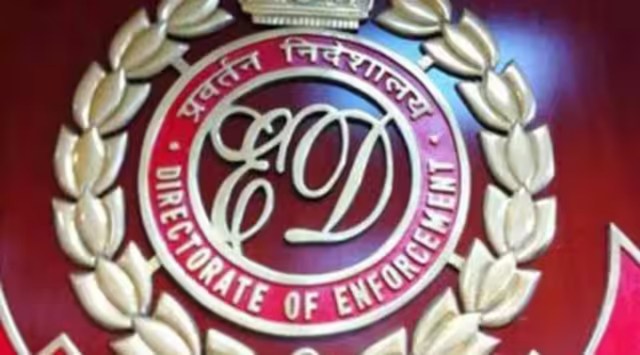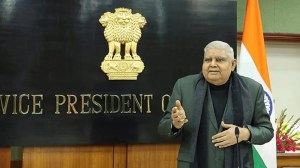ED reports seizure of properties of Devas Multimedia CEO declared fugitive economic offender
The case against Ramachandran Viswanathan stems from CBI and ED probes into a failed 2005 satellite deal between Devas and the ISRO’s commercial arm Antrix Corporation.
 The ED moved the special court in 2022 for declaring him a fugitive economic offender on account of his failure to appear for trial in the money-laundering case. (File)
The ED moved the special court in 2022 for declaring him a fugitive economic offender on account of his failure to appear for trial in the money-laundering case. (File) The Enforcement Directorate has reported the seizure of properties belonging to the US-based CEO and founder of the liquidated satellite communications startup Devas Multimedia, Ramachandran Viswanathan, who has been declared a fugitive economic offender by a Bengaluru court.
The ED reported the confiscation of properties to a special Prevention of Money Laundering Act court, stating that the properties were deposited with the central government on July 21. Measures for confiscating one more property are pending, the court was told.
“Accused No.2 Sri. Ramachandran Vishwanathan is declared as a Fugitive Economic Offender,” the special court in Bengaluru said on June 8 while also ordering the confiscation by the central government of bank accounts and mutual funds, valued at Rs 79.76 crore, declared proceeds of the money-laundering crime.
The money laundering case against Viswanathan, a reputed space entrepreneur in the United States, stems from CBI and ED investigations into alleged corruption around a failed 2005 satellite deal between Devas and the Indian Space Research Organisation’s commercial arm Antrix Corporation.
The declaration and order for the confiscation of property was made by the court under the Fugitive Economic Offenders Act 2018. The order to declare Viswanathan a fugitive economic offender is the third such order in the country, after the ones against Vijay Mallya and Nirav Modi.
The ED moved the special court in 2022 for declaring him a fugitive economic offender on account of his failure to appear for trial in the money-laundering case.
Viswanathan is among nine individuals and entities accused of money laundering by the ED in a chargesheet filed in July 2018. He and others are accused of diverting to the United States 85 per cent of Rs 579 crore of the foreign direct investment that Devas Multimedia received following a 2005 satellite deal with Antrix Corporation. The deal was annulled in 2011 by the UPA government by citing the requirement of the space spectrum allocated under the satellite deal for the defence sector.
Viswanathan is now president of Omnispace LLC, a satellite communications startup in the US putting together a constellation of satellites to power 5G from space – especially to provide connectivity to remote areas where terrestrial mobile networks do not work. Omnispace has signed an agreement with Tata Group firm Nelco Ltd to “distribute 5G non-terrestrial network, direct-to-device satellite services”.
Devas Multimedia director M G Chandrashekar, Devas chief technology officers Desaraju Venugopal and Nataraj Dakshinamurthy, finance director Ranganathan Mohan and three Devas subsidiaries are also accused in the case.
The Karnataka High Court in September 2022 acquitted Antrix Corporation’s former executive director K R Sridharamurthy in the money-laundering case by indicating that the satellite deal with Devas Multimedia was a decision of the board of Antrix Corporation.
The case against Devas Multimedia officials and others has roots in the 2005 deal to use two ISRO communication satellites to provide multimedia services to mobile devices in remote areas where conventional, terrestrial telecom networks do not have reach. Under the deal with Devas, the ISRO was contracted to lease two communication satellites for 12 years at a cost of Rs 167 crore.
The startup was to provide video-audio services to mobile platforms in India using the space band or S-band spectrum transponders on ISRO’s GSAT 6 and 6A satellites built at a cost of Rs 766 crore by the space agency.
The Devas Multimedia-Antrix Corporation agreement was annulled by the UPA government in February 2011, following allegations of a “sweetheart deal” in the backdrop of the 2G scam. After the NDA government came to power in 2014 the CBI and the ED began full-fledged investigations of the satellite deal.
The CBI filed a chargesheet in 2016 against Devas and Antrix and their executives, including former ISRO chairman G Madhavan Nair, on charges of corruption.
Following the cancellation of the 2005 deal, Devas Multimedia and its foreign investors approached international arbitration tribunals to seek compensation for losses they incurred. They have been awarded compensation by three arbitration tribunals over the failed deal.
The biggest compensation award has been a September 14, 2015, ICC tribunal award of over $ 1.2 billion, which was confirmed by a US federal court on October 27, 2020. Antrix Corporation has filed an appeal against this order in the US Court of Appeals for the Ninth Circuit.
Based on the CBI and ED cases against Devas Multimedia, the National Company Law Tribunal in India ordered the liquidation of Devas in May 2021 on charges that the company was created in a fraudulent manner. This order was upheld by the Supreme Court of India in January.
Devas Multimedia and its investors, including the German telecom major Deutsche Telekom, are involved in a protracted legal battle across the world over India’s decision to annul the satellite deal.
On July 18, a court at The Hague, in the Netherlands, ruled that a Devas Multimedia subsidiary in the US—Devas Multimedia America Inc—which is also accused along with Viswanathan in the ED’s money-laundering case, could not seek to enforce arbitration awards in the name of the liquidated company in India or its foreign investors.
The Hague court recognised the liquidation in India and ruled that a liquidator for the company was authorised to issue instructions to desist from seeking enforcement of arbitration awards in the name of the liquidated company.












